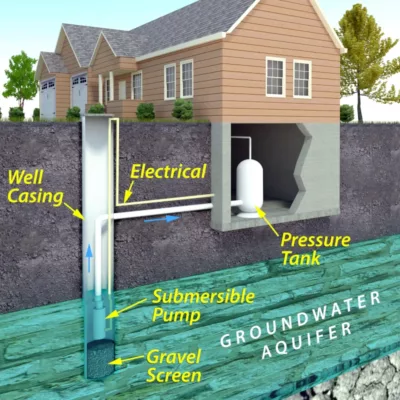Pennsylvania doesn’t regulate private wells, which means there are no rules requiring water testing or well inspections. But that doesn’t mean you should just ignore your well and assume everything is fine! A few simple actions can make sure your water is safe and keep your equipment running properly.
Annual Water Testing

You may also want to test for local water quality concerns on an annual or three-year basis. In Southeast Pennsylvania, consider testing for hardness and arsenic. If your well is located near a farm and agricultural runoff might make its way into your water supply, consider testing for nitrates and pesticides. If you live besides a factory or landfill, we recommend testing for metals. Those living besides a major highway might test for sodium and chloride from salt runoff in the winter. If your water is cloudy, you should test for detergents. Orange stains in your bathroom are likely caused by iron or manganese.
If you notice any change in your water’s taste, smell, or appearance, you should test immediately in case there’s a serious problem. As water experts, Dierolf Plumbing and Water Treatment can suggest the best tests for your specific circumstances, analyze your water, and recommend the right water treatment to remove or reduce any unwanted substances.
Routine Well Maintenance
Like any other appliance or component of your home, wells need regular maintenance. It’s even more important when you consider that you’re drinking and bathing in the water that comes from your well! A typical well will last anywhere from 20 – 50 years. Well owners should do the following to prolong its lifespan:
- Make sure the area around your well is always clean and accessible. Tree roots should not be allowed within 10 feet of the well. The grass should be cut regularly, and don’t let weeds or brambles obscure the area. Be careful while mowing not to run into the well casing. If damage occurs, call a well professional to fix it immediately to prevent contamination.
- Visibly inspect your well casing at least once a year. Make sure there aren’t any cracks, holes, or corrosion. The top of the well should be at least a foot off the ground, and the ground should be sloped away from it for proper drainage.
- Make sure all pump wiring is secured in an electric conduit pipe. If you smell burning or notice any corrosion, call a well technician immediately.
- You should have your well inspected by a professional every ten years to ensure all components are working correctly.
- If your well needs to be serviced or repaired, always hire a professional instead of attempting to do it yourself. You could make any problem significantly worse and risk expensive repairs, safety issues, and contaminating your well.
- Keep all records related to your well, including the initial construction report, water testing results, and any well maintenance logs.
Don’t Contaminate Your Water Supply
Keeping your PA well maintained depends just as much as what goes on outside your well as goes on in your well. Runoff, pipes, and other maintenance can affect your well water. Here are some things to consider:
- Keep fertilizer, motor oil, paint, pesticides, and any other chemicals far away from your well.
- Never pile snow, leaves, or lawn clippings around your well.
- Always follow the rules relating to minimum distance between wells and sewage systems, pastures, kennels, and buildings. Check with your contractor if you are adding to your property.
- Be aware of any changes in your surroundings that might affect your water supply (new farm or industrial plant, etc.) and test if you’re concerned. Typically, only activities you can see from your home will affect your well water. Something several miles away is unlikely to have an impact.
Protecting Your Water Supply
We recommend you have your well inspected by a professional at least every ten years. Your water should be tested for bacteria annually, with more extensive water testing done every three years. Keep the area around your well clear of excessive vegetation and free from contaminants, and ensure that the exterior of the well itself is in good physical condition. These simple steps should help ensure safe, clean water for many years to come.



